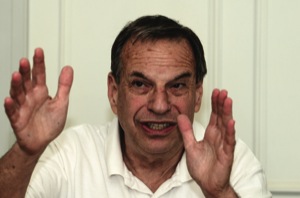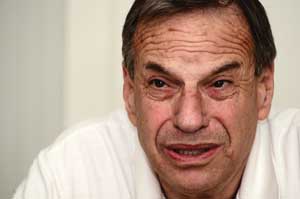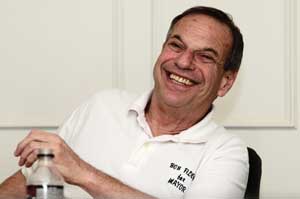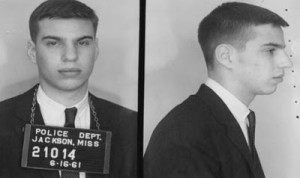
San Diego LGBT Weekly sat down with the lone Democrat in the race for mayor, Congressman Bob Filner recently to learn more about his views on LGBT issues; his vision for a Mayor Filner administration; and why, until very recently, his campaign seemed set on autopilot.
San Diego LGBT Weekly: You’ve been in Congress for a long time. This must be a strange time to be in Congress as a Democrat.
Rep. Bob Filner (D): It is strange and it’s also frustrating. The House is constructed, unlike the Senate, so that the majority party controls everything. We can’t filibuster; the majority party can ram things through. I have a lot of seniority – I’m like 55th in seniority – and I’m the ranking member of the Veterans Affairs Committee, so I have some input.
Were you chair of that committee when the Democrats had control of the House?
Yes, I was chair.
Compared to what you were able to do in the previous Congress and its now almost fabled productivity – especially during its final weeks – what do you do now?
So, one; you’re powerless institutionally. But, two; you’ve got all the Tea Party folks who think they’re right and you’re wrong. If you believe in something by faith; there’s no arguing with that. It’s like if one person believes in God and another one doesn’t. There’s no discussion and there’s no compromise. So, all politics is ruled out.
Do you mean politics as “the art of compromise?”
Yes. Without that, there’s nothing you can do. So I decided as chief executive of the eighth biggest city and all the issues I care about; I can do something here – whether it’s jobs; whether it’s the environment; whether it’s equal opportunity – we can do things here on the local level.
And then by the way … when I was first in elected office here; when I was on the school board; I was the only public official who would show up at … gay events where, now, everybody goes. When the Freedom Banquet, which was the San Diego Democratic Club’s, had started, there were folks lined up chanting about “fags” and “fag-lovers.”
And these were local people back then – as opposed to now they’d have to be bussed in people who’d be willing to shout epithets openly from Westboro Baptist in Kansas?
Exactly! And now there are two major candidates who are gay; and it’s not even an issue. I think that’s progress. But my point was that, locally, you can do things that you can’t do nationally.
But that presumes that the Republicans will stay in power in the House of Representatives.
Well, that’s a good point. But I also made the calculation that it looked to me that, unfortunately, the Democrats would not do what we had to do to take back the majority. I thought that, in general, the odds of me becoming chairman again were not probable.
Let’s get the one blemish on your record supporting LGBT rights – that is DOMA – out of the way. I think you’ve been on the record as saying you regretted the vote.
I didn’t understand the depth of the feeling on the issue. I have since voted differently and signed things differently.

When you say the depth of feeling, do you mean on the part of LGBT people?
I mean the sense of both commitment of two people, the love of two people, and the sense of oppression that other people can do this and you can’t. The unfairness of it worked out in so many practical ways, whether it’s hospital visits or whatever.
You mean the more than 1,200 legal rights and privileges enjoyed by straight married couples and not by gays and lesbians?
Right, and it’s just stupid. But, as a heterosexual person who’s been married, you can take quite a cynical view of marriage and wonder why would you want to – the last one took all my money; all my property. I mean if it doesn’t work out; then you’ve got to get divorced. As someone who’s been divorced a couple of times – and I don’t mean to make light of it – but I took it as … like why would you want this? I didn’t (consider) it deeply enough.
Did you take time to think about it?
I did meet with people about it. I mean it was an important vote. I probably met with more people about it after the vote (subdues chuckle). Ultimately I voted for (the Defense of Marriage Act). And I ended up regretting it.
How long after?
Oh, within a few months. People were upset after the vote. I think – I mean I don’t know why (pauses). I think people may have taken my vote for granted in the sense that they didn’t lobby me the way they might have otherwise. I was visited by couples and friends of mine who were very disappointed with my vote and I listened.
But you took that vote with the knowledge that not only were you voting to deny people the right to marry, but that they would also be denied tax and other benefits.
I guess I bought the notion that domestic partnership laws would or could take care of most of the legal distinctions or the 1,200 things you mentioned.
You’ve been accused by the opposition of kind of hiding out in this election.
Well, here I am. What does that mean, by the way. I’ve been at more debates than any of them; I’ve probably been at more public events than any of them. I don’t know if I’ve been in the press as many times as some of them because the way people cover things is different. I mean, where does that come from? Where’s the evidence of that?
I think you’ve hit on it. The press coverage has been on the other three and perhaps they don’t feel you’re not getting the kind of scrutiny they’ve been getting.
The political fact is that I’m one Democrat and there’s three Republicans. People are used to a partisan primary. So they think the Democrat will be me and the Republicans will have to break their votes up three ways and there’s a sense that they’re fighting each other and I don’t have to fight. But my own view of this is that any two of us could make the general election. I’m not assured of it just because I’m the Democrat. So, I have to work as hard as or harder than any of them. So, I don’t know why people think I’m not working hard at this. I’ll compare my schedule to theirs’ any day.
We did look at your schedule and it looks like you’re counting some of your availabilities as campaign events – your birthday for example.
If I show you my schedule you’ll see that I’m at twelve to fifteen public events every month.
Where reporters are?

Well, we send out my schedule. I can’t control whether reporters show up or not. We invite them.
We reported on the battle for the Republican Central Committee’s endorsement and that Carl DeMaio won at least partially by slamming Nathan Fletcher for his pro-LGBT voting record.
(Burst of laughter) Kind of ironic, isn’t it? I don’t know. I’ve heard Nathan complain he’s (DeMaio has) said one thing here and one thing there. I mean that would be very ironic if it’s true. Nathan should be applauded for that.
But can we go back for a minute?
Sure.
I had what I thought was a pretty significant press conference on Saturday where virtually every single locally elected Latino official was present. We had it at Chicano Park. Only one TV (station) showed up, and only one member of the (print) press showed up. Sure we set it up quickly, but we can’t be accountable for who chooses and doesn’t choose to show up.
You announced it two days before.
I know but I thought it was pretty significant. Besides, TV makes up their minds what to cover before anyone. We sent out a press release afterwards; we’ll see who covers it.
We’ll cover it … Now, what grade would you give yourself for supporting LGBT rights?
I’d give myself an “A” with that one caveat.
So if we’re talking about the present only, you’d give yourself an unqualified “A?”
I got into politics, I think you know, because of my activity in civil rights in the 1950s and ’60s. Back then it was black and white, but I knew you had to include Hispanics, you had to include Asians; so it’s a natural extension for me that gay rights are civil rights. I believe in equal opportunity for everyone and that has to include LGBTs. I’m always on the side of the underdog. That would be anyone who’s discriminated against and that would obviously bring me into support of the gay community.
Of course there are issues that come within that. I learn as I get more involved, whether it’s the Hispanic community or the gay community or whoever. The point is that I believe everybody deserves a shot at everything contained in the American Dream – everything that our society has to offer.
Do you ever long for those days of fighting for civil rights on the streets during the 1950s and 60s?
You know, I do. I am the Caucasian in the House of Representatives with the most colorful district. My district is the 85 percent people of color. No white guy is even close to that. Why am I able to win? I think because of my experience as someone who’s always fighting for equal rights. I always tell me constituents that we are all in this together. Because I have the black community saying to the Latino community, “If you learn to speak English, I’ll-be-on-your-side kind of thing. I mean it’s not that bad. But, I mean for the first time, maybe, in American history, when it comes to racial profiling, they’re not necessarily hitting African-Americans first. And I’m saying “you have to be on this side, because (if you aren’t,) you’ll be next again.” You know if you’re going to be arrested for walking-while-brown, you’re going to go back to the days when we had rampant arrests for driving-while-black.
I say the same thing hold true when I’m talking to some black ministers; “how can you be anti-gay marriage?”
Have you changed anyone’s mind?
I think minds are changing. I can’t give you individual names off the top of my head, but I will tell you it boils down to those who say “hey, I don’t have a choice about being black; they have a choice about being gay.” The general knowledge is that there isn’t a choice. But, even if there was, so what? People have the right to pursue their own lives.
I assure you, there’s not.
Anyway, I said you have to be in this fight.
Is that because of the old quote that “first they came for my neighbor and I said nothing ..? ”
And then they came for me and there was no one left to stand up for me.
What was the highlight of your civil rights activist period? What was your greatest achievement?
After I got out of jail during the freedom rides, where I had been for a couple of months, I saw that we brought down the whole

legal structures of segregation. Through a combination of the Interstate Commerce Commission, the Supreme Court, which overturned our convictions, I found myself at 18 – I thought there were thousands of us (doing the Freedom Rides); there were only about 300 of us – changed American history.
More of LGBT Weekly’s Q&A will be posted by 5 p.m. tomorrow, Friday, May 30. (-Ed.)










